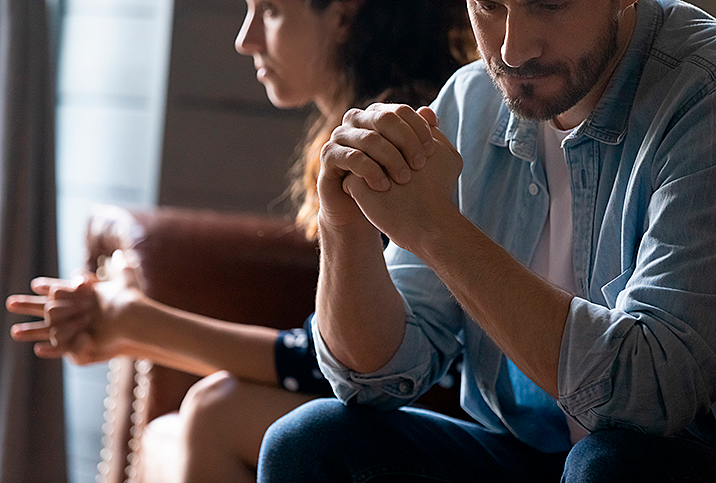What Is a Sex Therapist and What Should I Expect From One?

Acknowledging you and your partner might need to chat with a sex therapist isn't easy. It's not helped by popular media and pornographic movies, which would have you believe sex requires little or no effort and all parties involved always finish. But sexual activity in any form in the real world requires lots of communication, mutual understanding and, most importantly, feedback.
For anyone struggling to navigate this process, a sex therapist may help facilitate a more seamless approach.
How exactly can a sex therapist help?
People seek sex therapists for many different reasons, including trying to solve sexual concerns, according to Carolin Klein, Ph.D., a sex therapist at West Coast Centre for Sex Therapy in Vancouver, British Columbia.
"These might be related to sexual functioning: concerns about either low or high desire or desire discrepancies in couples, arousal/erectile concerns or orgasmic concerns," she said. "Also, sexual pain, sexual shame and/or anxiety and problematic sexual behaviors, including what many term 'sexual addictions'."
Seeing a sex therapist may be motivated by a desire to explore, accept or acquire a better understanding of your sexuality, which could include the exploration of sexual interests, sexual orientation and gender identity.
Lastly, people sometimes want a sex therapist's advice on exploring new ways of being sexual, such as wanting to try open relationships.
What does the first appointment look like?
The goal of sex therapy is to help the client live a life that is fulfilling, healthy and happy.
The first appointment helps set the groundwork for this goal. Initially, the therapist tries to understand a client's individual goals and barriers, and what progress means to them. A therapist also asks about relevant biological, psychological, relational, familial, societal and treatment history.
"The first appointment generally involves the client sharing what brings them into treatment, and the therapist asking very specific follow-up questions about the client's goals and history," Klein explained.
"Towards the end of the session, the therapist will often provide feedback on their treatment approach and recommendations for the next steps," she added. "That way, the client can determine whether they feel the therapist and the therapist's therapeutic approach are a right fit before booking further sessions."
The result of the first meeting can be reassuring to clients.
"After their first session, most clients report feeling relieved to be able to talk about sexual issues in a safe and respectful environment," said Petra Zebroff, Ph.D., a relationship counselor and clinical sexologist in Vancouver, British Columbia.
How can I prepare for that first meeting?
"The best thing a client can do to prepare is to come to the appointment having thought about their goals for treatment," Klein said. "Bring in the names and doses of any medications they are taking, as some medications can affect sexual functioning."
Other than that, the therapist asks many questions about the client's sexual history, which can include the sexual messaging the client received while growing up, their current sexual beliefs and values as well as relationship history. A client may hear questions about relevant medical and mental health history, which could include instances of negative, coercive or traumatic sexual interactions.
Additionally, the therapist may focus on the client's current approach to sex compared to what they hope to achieve with therapy.
Will I have any homework?
Yes, there's homework, according to Zebroff.
After an in-depth assessment, clients get homework that is tailor-made for their situation, issues, comfort level and personality. She pointed out that homework varies dramatically from communication exercises and sexual suggestions to step-by-step sexual exercises.
Klein noted that homework depends largely on the client's specific concerns as well as the therapist's therapeutic approach. For instance, a client who is coming in to explore and better understand their sexuality—such as their sexual orientation—may not have a lot of homework, and therapy may focus more on in-session discussion and exploration.
But for a client coming into the session to reduce performance anxiety and overcome concerns about sexual function, the therapist will likely recommend some very specific sex therapy and anxiety-reduction techniques for homework to help the client reach their goals.
Klein added that most sex therapists, at least sometimes, provide specific recommendations for between-session exercises that can help clients think about sexuality in new ways and reduce distress linked to their present concerns. A therapist's assignments allow the client to relate to themselves and their partners in new and more connective ways.
What if my partner is unwilling to try sex therapy?
It's not constructive to push a partner who isn't open to therapy, Klein said. It may result in the partner not fully opening up in sessions, and they also may be unlikely to follow any of the therapist's recommendations. Pushing may lead to pent-up resentment.
However, it might be worth your while to encourage your unwilling partner to attend at least the first session with you.
"Sometimes partners become open to therapy after meeting with the therapist for the first time and hearing how they may be able to help address some issues," Klein said.
Asking why your partner is reluctant can help clarify the problems to address. If they're still unwilling to attend, sex therapists can work with just one partner in the initial phase, even though it's less ideal than both partners being present.
To make the most of your sex therapy sessions, Klein recommended being open to the therapists' suggestions as well as booking regular appointments. Scheduling time between sessions to work on the homework is important.
Zebroff recommended doing the take-home exercises to help increase the comfort, motivation and effectiveness of sex therapy. She suggested supplemental resources such as reading materials and watching videos with clients when they're feeling motivated.
Therapy vs. medication
Then there is the question of whether to use therapy or medication.
When should therapy be recommended over medication?
"When the concerns are not due to a medical condition but rather due to attitudes, beliefs and approaches to sex that lead to or maintain the exact problems the client wants to resolve," Klein answered.
If the clients' concerns, even when caused by a medical condition, are leading to disconnection and friction between partners or causing distress—anxiety, shame, sadness, frustration or anger—therapy may be needed to resolve the issues and help the client deal with these painful emotions.
What are green flags to look for in a sex therapist?
"Anyone can call themselves a sex therapist, as it is not a protected term," Klein noted.
This means there is a wide range of sex therapists, from those with plenty of direct education, training and experience to those with virtually none. Klein recommended looking for sex therapists who have a graduate degree in the field and can provide evidence of having received specific education and training in sex therapy.
Many therapists also provide a free, brief telephone consultation before booking so you can ask them questions and get a feel for their style and approach before scheduling a formal session.
Finally, ensure you feel comfortable opening up to your therapist.
"With something as personal as talking about sex, it's critical to have a therapist that you perceive as open, genuinely caring and nonjudgmental," Klein said.


















